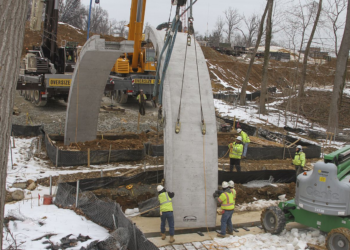There is a large chasm between the Trump administration’s public narrative about the Iran nuclear talks and the true story that is unfolding behind the scenes. The threatening, maximalist public rhetoric serves a more hopeful, cooperative diplomacy.
Perhaps to keep the pressure on, President Donald Trump had already threatened military action if Iran does not make a deal, and last week he accused Iran of dragging its feet and repeated his threat to bomb their civilian nuclear sites. “I think they’re tapping us along,” Trump said after the first round of talks, in Oman.
But despite Trump’s negative assessment, the first round seems to have gone as well as could be hoped. Iran called the meeting “constructive” and “respectful.” The U.S. called it “constructive” and “positive.”
The best evidence that the talks were a success is that the two lead negotiators, Iran’s Foreign Minister Abbas Araghchi and Trump’s special envoy Steve Witkoff, spoke directly after the meeting. Iran had insisted that direct talks would be contingent on the success of the indirect talks. So initial reports that the two briefly spoke face-to-face were encouraging. Encouraging became hopeful when it was later reported that the two actually spoke for 45 minutes.
A further sign of success is that the first round, intended primarily to establish the format of future talks, led to a second round in Rome. The Rome talks led to an agreement to begin work on a framework for a potential deal, and also to a third round involving technical talks as well as higher-level meetings.
Trump’s pessimistic language of “tapping us along” and his threatening language about military options seem detached from the diplomatic situation and may be intended to push it forward rather than describe it.
The public, maximalist language about the Trump administration’s diplomatic goals also seems at odds with what may be the true story. Trump himself has said the goal is merely preventing Iran from acquiring a nuclear weapon: “You know, it’s not a complicated formula. Iran cannot have a nuclear weapon.” But his team has gone further. National Security Advisor Mike Waltz has said that Iran must be prevented, not only from enriching weapons grade uranium, but from enriching at all. He says the U.S. is demanding “full dismantlement,” that Iran “has to give up its program” and stop “enrichment” all together. “The full program,” Waltz said. “Give it up or there will be consequences.”
Witkoff has seemingly retranslated Trump’s message in a more hawkish register. Last week he wrote on social media that “Iran must stop and eliminate its nuclear enrichment and weaponization program,” calling that “a Trump deal.”
After the second round of talks, Secretary of State Marco Rubio said that Iran can have a civilian nuclear program. However, he said that they cannot enrich their own uranium but would have to import uranium enriched up to 3.67 percent—enough to run its power reactors for energy but short of the 19.5 percent needed to produce medical isotopes for imaging and treating cancer in its hospitals.
While the U.S. team says the talks center on Iran’s entire enrichment program, Iran has a different idea. Ayatollah Ali Khamenei, Iran’s Supreme Leader, has fully empowered his team to negotiate with the limit that Iran will not negotiate “the full dismantling of Iran’s nuclear infrastructure.”
Once again, there is an important hint that the U.S. team’s maximalist language is masking a more moderate diplomatic reality. That hint comes, not from the statements made by the American or Iranian negotiating teams, but from the statement of the Omani foreign ministry who mediated the talks. The next phase, the statement says, “aims to reach a permanent and binding agreement that guarantees Iran’s full renunciation of nuclear weapons” while “safeguarding… its right to develop nuclear energy for peaceful purposes.”
Subscribe Today
Get daily emails in your inbox
The statement suggests that, behind closed doors, the negotiations are over verifiable limitations on Iran’s civilian nuclear program. Trita Parsi, an Iran expert and executive vice president of the Quincy Institute for Responsible Statecraft, told me that the talks are “centered on a verification-based solution.”
The Iran team, stung by their experience of Trump and the U.S. unilaterally pulling out of the previous 2015 JCPOA nuclear agreement, is also insisting on discussing “a process for lifting economic sanctions” and “guarantees the U.S. won’t walk away again.”
Iran has already demonstrated, under the JCPOA, its willingness to comply with verifiable limitations on its levels of enrichment. The U.S. should not only try to get a new agreement, but accept that signing a deal means you cannot tear it up on a whim. Despite the threatening, maximalist language of the Trump administration, there are signs that it intends to go that direction—so there is real hope that diplomacy can succeed.







